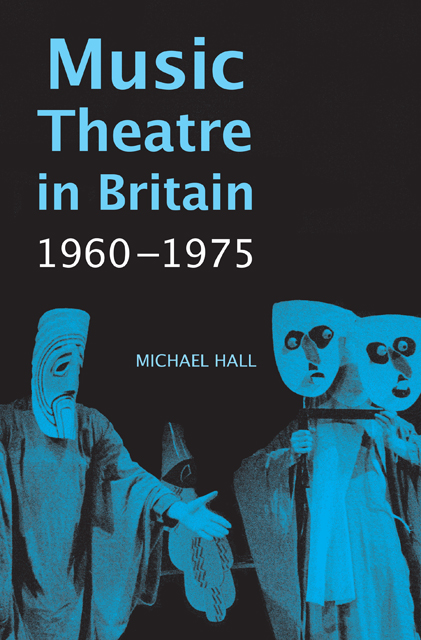4 - Performers and Performances
Published online by Cambridge University Press: 23 February 2023
Summary
Three composers dominated British Music Theatre during the 1960s and 1970s: Harrison Birtwistle, Peter Maxwell Davies and Alexander Goehr. As well as producing more music-theatre pieces than anyone else, they also ran two of the six organisations devoted to mounting them. Birtwistle and Maxwell Davies ran the Pierrot Players (later The Fires of London), and Goehr the Brighton Festival Ensemble (later the MusicTheatre Ensemble).
Another group, Focus Opera, entered the music-theatre arena in March 1968, when it gave a programme of works by Kagel, Ligeti and Cornelius Cardew, which it billed as ‘Three? Avant-Garde? Operas?’ Focus Opera was founded in 1963 to perform little-known one-act operas by classical or twentieth-century composers writing in a traditional style. But from 1968 until 1975 it presented at least twice a year, sometimes in association with the Morley College Music Theatre Group, programmes that usually included music-theatre works by young composers.
Even more consistently devoted to Music Theatre by young composers was the Music Department at York University. Here the composers had to create works to perform themselves, as no trained singers or professional instrumentalists were available to them. Before 1973 most of their work was performed at the university in the Jack Lyons Concert Hall, but in 1973 a Music Theatre group called ‘Clap’ was formed. Roger Marsh told me that its founder members were Bernard Rands, Vic Hoyland, Melody Lovelace, Tom (Archer) Endrich, Dominic Muldowney, Jonty Harrison and himself. ‘Clap’, he told me, toured arts centres and colleges in the UK with programmes that combined classic works such as Berio’s Sequenza for Voice, Berberian’s Stripsody and Rands’s Ballad II, with new pieces by members of the group. The ensemble enjoyed success for about two years, before a disastrous appearance at the Shaw Theatre in London in 1974, playing to an audience of about thirty on a stage dominated by a London bus left there for an impending production.
The largest organisations involved with Music Theatre were the London Sinfonietta and the BBC Symphony Orchestra, when it performed at the Roundhouse, which it first used for a Prom in 1971, when George Newson’s Arena, discussed below and in Chapter Eight, was performed.
- Type
- Chapter
- Information
- Music Theatre in Britain, 1960–1975 , pp. 71 - 92Publisher: Boydell & BrewerPrint publication year: 2015



